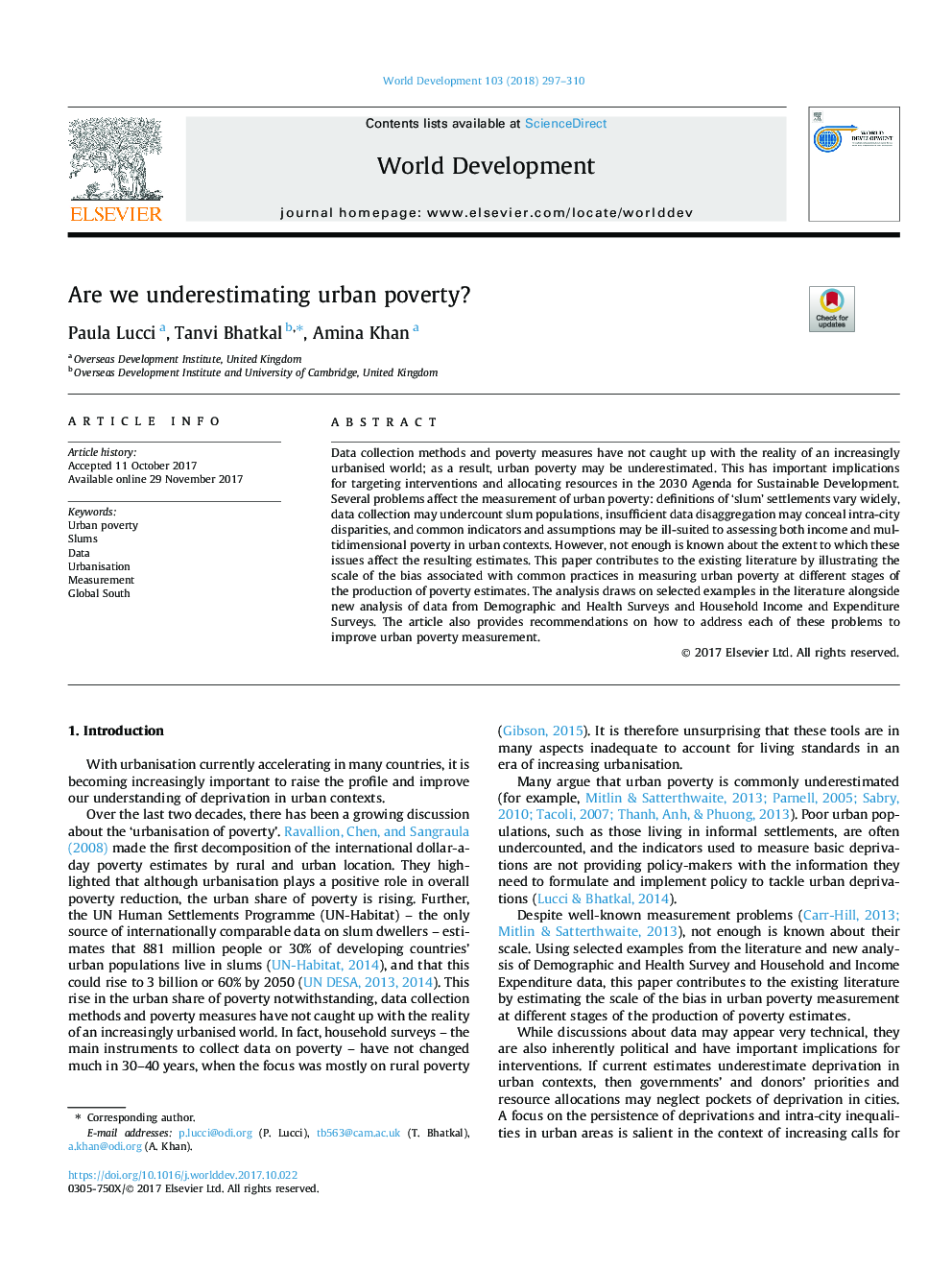| کد مقاله | کد نشریه | سال انتشار | مقاله انگلیسی | نسخه تمام متن |
|---|---|---|---|---|
| 7392346 | 1481115 | 2018 | 14 صفحه PDF | دانلود رایگان |
عنوان انگلیسی مقاله ISI
Are we underestimating urban poverty?
ترجمه فارسی عنوان
آیا ما فقر شهری را کم ارزش گذاری می کنیم؟
دانلود مقاله + سفارش ترجمه
دانلود مقاله ISI انگلیسی
رایگان برای ایرانیان
کلمات کلیدی
فقر شهری، لاغرها داده ها، شهرنشینی، اندازه گیری، جهانی جنوبی،
ترجمه چکیده
روش های جمع آوری داده ها و اندازه گیری های فقر با واقعیت یک جهان به طور فزاینده شهری روبرو نشده اند؛ به عنوان یک نتیجه، فقر شهری ممکن است دست کم گرفته شود. این امر پیامدهای مهمی برای هدفگیری مداخلات و تخصیص منابع در برنامه 2030 توسعه پایدار دارد. مشکلات متعددی بر اندازه گیری فقر شهری تأثیر می گذارند: تعاریف سکونتگاه های "زاغه ای" به طور گسترده ای متفاوت است؛ جمع آوری داده ها ممکن است جمعیت کم جمعیت را پایین آورند؛ تقسیم اطلاعات نامناسب ممکن است تفاوت های داخل شهر را پنهان کند؛ و شاخص های و مفروضات مشترک ممکن است برای ارزیابی هر دو درآمد و فقر چندملیتی در مناطق شهری. با این حال، به اندازه کافی در مورد میزان این مسائل برآوردهای حاصل تاثیر نمی گذارد. این مقاله به ادبیات موجود کمک می کند که نشان دهنده مقیاس تعصب مرتبط با شیوه های رایج در اندازه گیری فقر شهری در مراحل مختلف تولید تخمین های فقر است. تجزیه و تحلیل بر روی نمونه های منتخب در ادبیات همراه با تجزیه و تحلیل جدید داده ها از نظرسنجی های جمعیتی و بهداشت و مطالعات درآمد و هزینه های خانگی است. این مقاله همچنین توصیه هایی را در مورد چگونگی رسیدگی به هر یک از این مشکلات برای بهبود اندازه گیری فقر شهری ارائه می دهد.
موضوعات مرتبط
علوم انسانی و اجتماعی
اقتصاد، اقتصادسنجی و امور مالی
اقتصاد و اقتصادسنجی
چکیده انگلیسی
Data collection methods and poverty measures have not caught up with the reality of an increasingly urbanised world; as a result, urban poverty may be underestimated. This has important implications for targeting interventions and allocating resources in the 2030 Agenda for Sustainable Development. Several problems affect the measurement of urban poverty: definitions of 'slum' settlements vary widely, data collection may undercount slum populations, insufficient data disaggregation may conceal intra-city disparities, and common indicators and assumptions may be ill-suited to assessing both income and multidimensional poverty in urban contexts. However, not enough is known about the extent to which these issues affect the resulting estimates. This paper contributes to the existing literature by illustrating the scale of the bias associated with common practices in measuring urban poverty at different stages of the production of poverty estimates. The analysis draws on selected examples in the literature alongside new analysis of data from Demographic and Health Surveys and Household Income and Expenditure Surveys. The article also provides recommendations on how to address each of these problems to improve urban poverty measurement.
ناشر
Database: Elsevier - ScienceDirect (ساینس دایرکت)
Journal: World Development - Volume 103, March 2018, Pages 297-310
Journal: World Development - Volume 103, March 2018, Pages 297-310
نویسندگان
Paula Lucci, Tanvi Bhatkal, Amina Khan,
